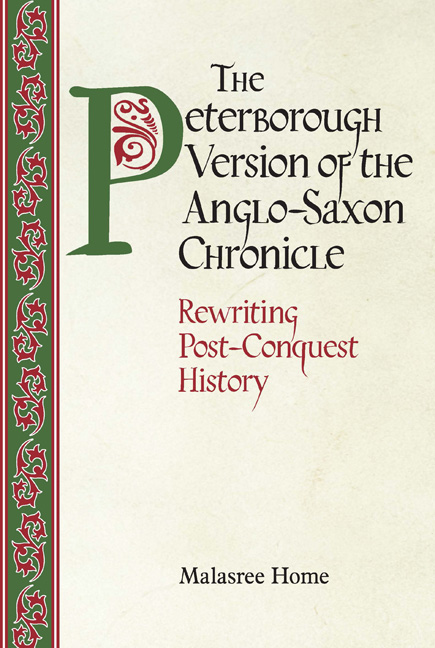Book contents
2 - Continuing the Chronicle
Published online by Cambridge University Press: 05 December 2015
Summary
History in motion: the writing of the Peterborough Continuations
The Peterborough Interpolations demonstrate the compiler's awareness of the form, structure and content of the received proto-E Chronicle text. This acknowledgment of a textual past co-exists with Peterborough's appropriation of the Anglo-Saxon Chronicle. This is particularly apparent in the charters, which, transformed as Chronicle narrative and associated with a known tradition of vernacular historiography, not only inscribe the geography of the place into the text, but are also used to support Peterborough's ancient claims to authority. This local appropriation is taken a step further by the Continuations, which were written after the compilation of the Chronicle till 1121.
Like the Interpolations, both the First and the Second Continuations were written in a form of English which deviated from the standard West Saxon more prevalent in the earlier parts of the Chronicle. To Plummer, this presumably ‘current’ state of the language was an indication that the E text remained a ‘living’ Chronicle and not a mere compilation. Cecily Clark commented on the importance of the First and Second Continuations as evidence of the transitional linguistic stage of Old English towards Middle English, noting that in some cases the First Continuation provided a richer source of information. Irvine too notes that the language of the Peterborough Continuations is ‘early Middle English, distinctly East Midland in dialect’. Both scribes show evidence of the transition towards Middle English in their morphology and phonology, with departures from traditional West Saxon usage being more advanced in the case of the Second Continuator. Irvine particularly notes the levelling of unstressed syllables and the overall tendency to reduce inflexions in the Continuations as a whole, while noting that the pronominal system and orthography of both scribal hands are generally consistent with late West Saxon. However, a consideration of only the linguistic transition towards Middle English occludes the implications of a change in authorship between the two Continuations.
- Type
- Chapter
- Information
- The Peterborough Version of the Anglo-Saxon ChronicleRewriting Post-Conquest History, pp. 61 - 100Publisher: Boydell & BrewerPrint publication year: 2015



